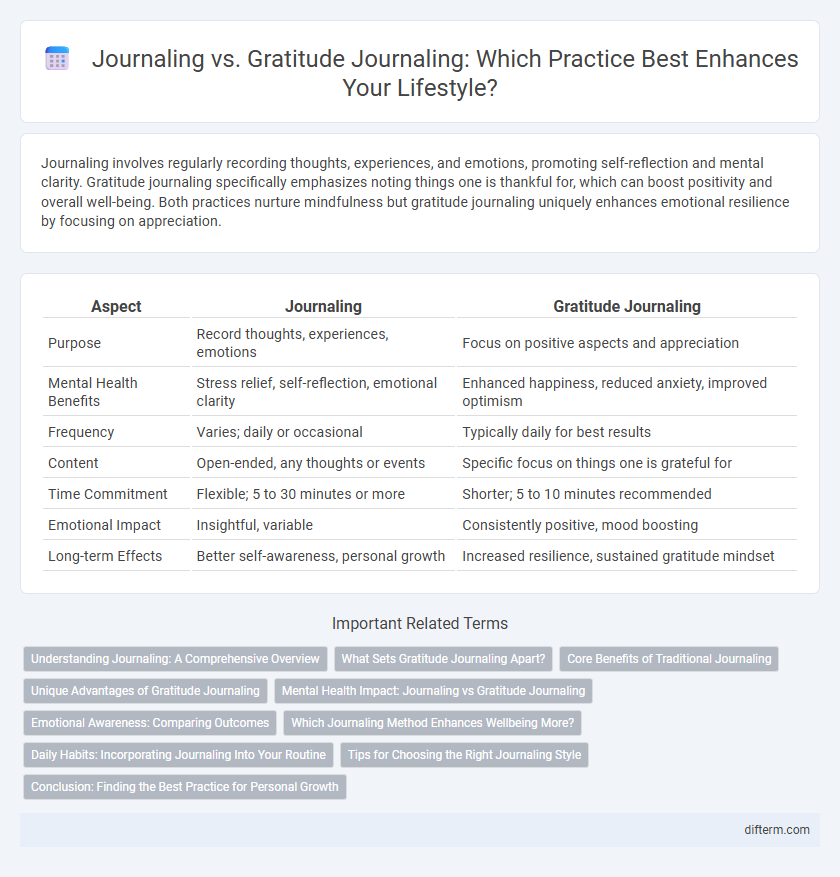Journaling involves regularly recording thoughts, experiences, and emotions, promoting self-reflection and mental clarity. Gratitude journaling specifically emphasizes noting things one is thankful for, which can boost positivity and overall well-being. Both practices nurture mindfulness but gratitude journaling uniquely enhances emotional resilience by focusing on appreciation.
Table of Comparison
| Aspect | Journaling | Gratitude Journaling |
|---|---|---|
| Purpose | Record thoughts, experiences, emotions | Focus on positive aspects and appreciation |
| Mental Health Benefits | Stress relief, self-reflection, emotional clarity | Enhanced happiness, reduced anxiety, improved optimism |
| Frequency | Varies; daily or occasional | Typically daily for best results |
| Content | Open-ended, any thoughts or events | Specific focus on things one is grateful for |
| Time Commitment | Flexible; 5 to 30 minutes or more | Shorter; 5 to 10 minutes recommended |
| Emotional Impact | Insightful, variable | Consistently positive, mood boosting |
| Long-term Effects | Better self-awareness, personal growth | Increased resilience, sustained gratitude mindset |
Understanding Journaling: A Comprehensive Overview
Journaling involves recording thoughts, experiences, and emotions to enhance self-awareness and emotional clarity, while gratitude journaling specifically focuses on acknowledging and appreciating positive aspects of life to boost overall well-being. Research shows gratitude journaling can increase happiness by fostering a positive mindset and reducing stress, whereas traditional journaling supports mental health by processing complex feelings. Both practices serve unique roles in personal growth, with gratitude journaling emphasizing thankfulness and journaling providing a broader reflective space.
What Sets Gratitude Journaling Apart?
Gratitude journaling emphasizes recording specific moments of thankfulness, fostering a positive mindset and enhancing emotional well-being. Unlike traditional journaling, which may cover a broad range of daily experiences, gratitude journaling targets appreciation, boosting resilience and reducing stress. Neuroscientific studies show that regular gratitude journaling activates brain areas linked to dopamine and serotonin production, promoting overall mental health.
Core Benefits of Traditional Journaling
Traditional journaling enhances self-awareness by providing a structured space for personal reflection and emotional processing. It improves critical thinking and problem-solving skills by encouraging detailed exploration of thoughts and experiences. Consistent journaling supports mental clarity and stress reduction, promoting overall emotional resilience and well-being.
Unique Advantages of Gratitude Journaling
Gratitude journaling offers unique advantages by specifically enhancing mental well-being through focused appreciation of positive experiences, which increases serotonin and dopamine levels. Unlike general journaling, it cultivates a mindset of abundance and resilience by consistently shifting attention away from stressors to meaningful moments. Research shows that regular gratitude journaling improves sleep quality, reduces symptoms of depression, and strengthens social bonds by fostering empathy and compassion.
Mental Health Impact: Journaling vs Gratitude Journaling
Journaling promotes mental health by encouraging emotional expression and self-reflection, reducing stress and anxiety. Gratitude journaling specifically enhances well-being by shifting focus to positive experiences, increasing resilience and fostering a more optimistic mindset. Both practices improve mental clarity, but gratitude journaling has a stronger impact on boosting mood and reducing depressive symptoms.
Emotional Awareness: Comparing Outcomes
Journaling enhances emotional awareness by allowing individuals to process a wide range of feelings and experiences, fostering self-reflection and emotional regulation. Gratitude journaling specifically directs focus toward positive aspects of life, increasing feelings of contentment and reducing stress levels. Research indicates gratitude journaling more effectively boosts emotional resilience and overall happiness compared to general journaling practices.
Which Journaling Method Enhances Wellbeing More?
Gratitude journaling, by explicitly focusing on positive experiences and emotions, tends to enhance wellbeing more effectively than traditional journaling, which may include a broader range of thoughts and reflections. Studies show that gratitude journaling promotes increased happiness, reduced stress, and improved mental health by fostering a mindset of appreciation and mindfulness. While both methods support self-awareness, gratitude journaling's targeted practice is linked to stronger psychological benefits and sustained emotional resilience.
Daily Habits: Incorporating Journaling Into Your Routine
Daily journaling enhances self-awareness by capturing thoughts and emotions, fostering mental clarity and personal growth. Gratitude journaling specifically cultivates a positive mindset by focusing on daily blessings and fostering emotional resilience. Integrating either practice into a consistent routine supports mindfulness and strengthens overall well-being.
Tips for Choosing the Right Journaling Style
When choosing the right journaling style, consider your personal goals: traditional journaling allows free expression of thoughts and emotions, while gratitude journaling emphasizes daily positivity and mindfulness. Evaluate how each approach affects your mental well-being and motivation by tracking your mood and productivity improvements over time. Experiment with combining both styles to create a balanced routine that fosters self-awareness and emotional resilience.
Conclusion: Finding the Best Practice for Personal Growth
Journaling enhances self-reflection by allowing individuals to explore emotions and experiences broadly, while gratitude journaling specifically cultivates positivity by focusing on appreciation and thankfulness. Combining both practices can maximize personal growth by balancing introspection with a positive mindset, leading to improved mental health and emotional resilience. Tailoring the approach to individual needs ensures the most effective path for sustained self-improvement.
journaling vs gratitude journaling Infographic

 difterm.com
difterm.com